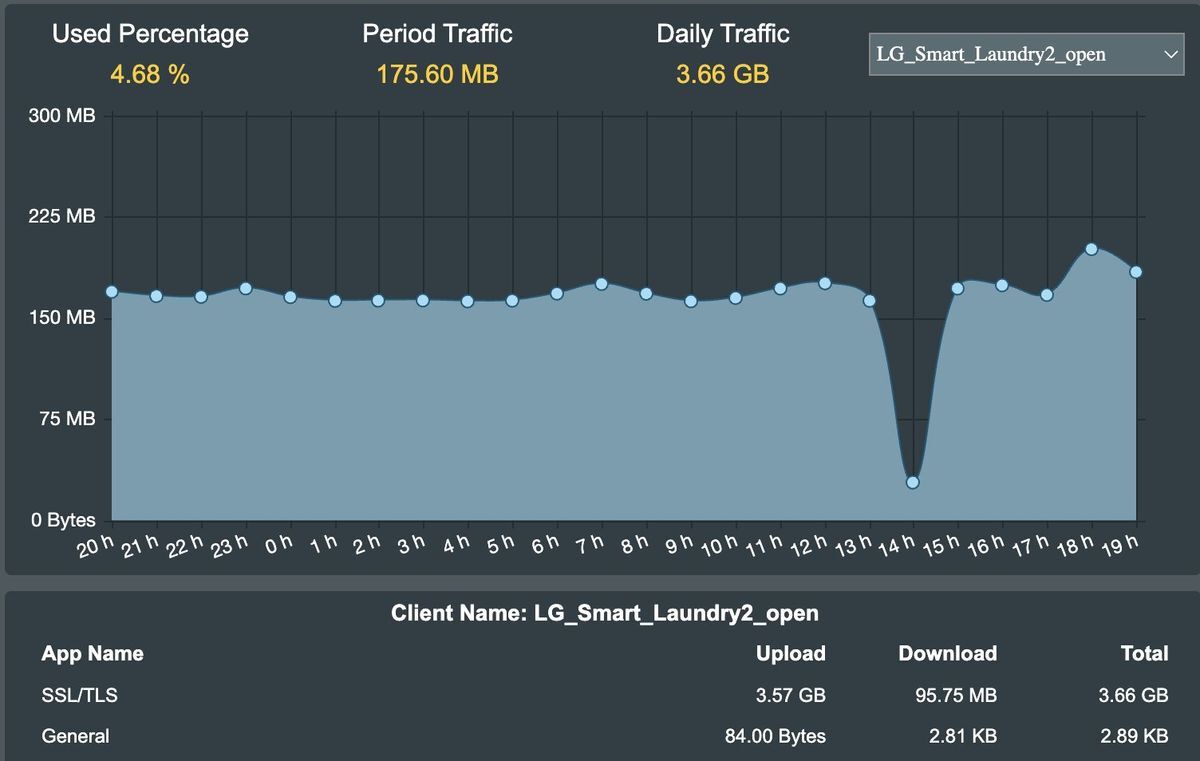Bought “smart” LG fridge, range and dishwasher a couple of years ago and never connected any of them, they function like they are supposed to, refrigerate, heat food and clean dirty dishes. No need to connect.
Fridge manual explained something like “in case of peak energy consumption your smart energy company can send a signal to your fridge to not use power”. What the heck do I need that for? To find spoiled food and mold growing in the fridge later on?
Why does one need to connect a range to WiFi?
Tomorrow is my turn to post about this
deleted by creator
As a guy with some tendencies to worry if I turned my stove off Everytime I leave the house, this feature seems right up my list of needs
Thanks for that pov! I had not considered it and to my surprise I just thought of someone in my family that has the same type of worry you do, and that person would probably benefit from that kind of peace of mind like you suggested.
Because now manufacturers are tying the last year of their warranty to having the devices connected to their stupid information harvesting apps.
Ugh! Now that you say that we are probably not far away from WiFi enabled ranges being a feature… that WHEN enabled will allow you to:
- Cook uninterrupted or at any time of that day
- Get discounted prices on gas
- Get discounts on home/renters insurance
- Receive discounts on range/oven cleaners
- Enable the back burners
- Enable broiling capability
- Allow in oven light to be turned on and off
- Claim warranties (as you suggested)
It would be so funny if washing machines were the first to become sentient
“Wash my clothes”
“No…”
Some people have hourly electric pricing, in their case it’s worth scheduling stuff based on predicted pricing. How that should work is that you’d have a home server which controls your IoT stuff (so the gadgets themselves can be firewalled from the internet and controlled only by you) and then your server would fetch pricing data and pause stuff that doesn’t need to run when prices are high and run stuff like washing when it’s cheap
TIL - cool, makes sense.
It would make sense if we had a server that could fetch prices instead of opening up potential weak systems to the internet.
The only reason I used my range’s WiFi is to preheat it from downstairs or the store lol
what the heck is a range? search results are expectedly useless as it’s an extremely common word for something else
It’s an oven with a stove on top. Google “cooking range”.
I’ve never called it that, but that’s the name for it.
I was looking at one of those new washer/dryer combo units recently (I have heard these are common in Europe but they are fairly new to the US market) and it had a unique feature where you could fill the detergent reservoir, scan the barcode on the bottle, and the machine would dispense the appropriate amount of detergent for the load.
I can see connecting to the Internet on occasion might be helpful here to update the local barcode database, but I doubt it should need updating more often than once or twice a year. Does that mean the feature will work without constant live updates? Probably not, but I doubt it needs to update very often to remain current.
It really irritates me when IoT devices force you to use “the cloud” for access. My home automation consists of roughly 100 devices. The vast majority are Zigbee, but a few use wifi. With the exception of my irrigation controller, all the wifi devices are blocked at the firewall from accessing the internet. The fact that I have to send a command half way across the country to a remote server only so it can send it right back to my home network when I want to change the watering schedule for my plants is ridiculous. Sure, I could buy a different controller, but I already spent $300 once. I’m not doing it again.
You should explain this to your plants so they show the appropriate level of gratitude.
Will wifi switches locked down to home network only still function?
It depends on the switch. If it has an API or an app that can be used locally, then yes.
If it has an API that can be used locally, then sure. That’s the whole point of Zigbee, is that it’s an open standard that any IoT devices can connect to and use. So you can send local commands to any local Zigbee device, as long as they have an API that allows for it.
Open standard… hah… like bacnet was supposed to be? More and more i deal with bacnet devices that make some data unreadable (proprietary) so what was the point?
Agree with other posts about sending data to the cloud to work. Also I’m certainly way behind on my washing machine tech because I can’t fathom a reason they should be online. So I can get an alert when the cycle is done? Ok fine… stupid but fine - as long as it stays local.
There are probably 3 main groups of people with WiFi appliances:
- The vast majority of people don’t care, and put it on their normal WiFi router and would never notice something like this
- A smaller group of people don’t care much, but pay attention to their bandwidth usage and would spot an appliance trying to send 3.7 GB of data a day
- A much smaller group of people are paranoid and would put the device on its own isolated subnet, or use firewall-type features to limit the access their appliances have to the Internet.
My guess is that if this were a widespread problem, people in the second group would notice, or would have immediately checked and chimed in and said “holy crap, mine is doing this too”. I didn’t hear many people saying that, so I’m guessing this is a bug, and it’s either a one-off weirdness, or it’s a bug related to people in group 3 who are blocking their appliances from being able to connect to the Internet.
It’s probably something as simple as a badly programmed firmware update check that doesn’t do exponential backoff when it fails. It probably connects, fails, then immediately tries again. A proper exponential backoff would wait before trying again, and if it failed again it would double the wait time down to some minimum value like once per day or something.
Incidentally, this is also why claims about smartphones monitoring people’s conversations when they’re supposedly off is BS. That would require either huge amounts of bandwidth to transmit all the conversations, or huge amounts of computing power inside the phone to decode the voices. Either way you’d be using tons of battery, and probably a significant amount of bandwidth. There are enough paranoid people out there that if this were a real thing, someone would have caught the devices doing it by now.
The article gets into what actually happened.
Dude’s Asus router was incorrectly reporting bandwidth usage.
I think the largest group by far isn’t listed: people who bought an appliance and didn’t care at all that it had WiFi and never connected it their network.
“Error: Wi-Fi must be enabled and connected to load detergent.”
I am getting annoyed at the constant demands from tech that supposedly is owned by me. My gym has an app. It’s cute I guess. It wants to talk to a Fitbit, I blocked access. Every time I go to the gym now I have to confirm again that I don’t want it to talk to a Fitbit.
Don’t even own a Fitbit
LG’s app is an absolute privacy nightmare too. That app must be used if you want access to any smart appliance features and it requires precise location permissions 100% of the time. Even then, the app features are mediocre, it doesn’t work very well and often doesn’t notify of a finished wash load until long after it’s completed.
Why anyone would want to allow their washing machine manufacturer to continuously track their exact location in exchange for some crappy, poorly implemented features is beyond me.
They probably want to see at which aisle your washing machine spends the most time on its grocery trip.
I just use a timer on my phone … average wash cycle I use is about 30 minutes … just set a timer on your phone … KISS, Keep It Simple Stupid
The LG app also checks SafetyNet/Play Integrity so you can’t use it with root. They probably fear that you can then unleash how much more of a privacy nightmare it is.
Thanks for pointing out the location service thing. I just killed that shit.
Just looked at the app’s permission settings on my phone… set to only allow location while being used.
Like you I don’t see much use for the app, though the notifications can be handy if you want to know when a load us finished and you can’t hear it’s beeps. I work out of my basement with my washer upstairs so that can be the case with me. But still rare that I ever use it.
Thinking back, I seem to remember that in order to receive notifications the app had to be running in the background while phone location was turned on, giving LG precise location tracking all the time. Is that no longer the case?
I don’t think so. I’ve had the notifications off though so I’m not 100%. I turned them back on so I’ll know soon enough.
I’ve re-enabled notifications now and was receiving them fine with location setting of “only when app in use”. Then this morning I disabled location permissions entirely for the app and I continue to receive the notifications.
The one useful feature I’ve missed is a high temperature warning for my refrigerator, so since they fixed the app it may be time for another try. Thanks for checking that out.
I deleted the app and disconnected my LG appliances from wifi over a year ago. Maybe they fixed the issue.
Thats gonna me my new excuse when I loose in CoD. The washing machine was clogging up the Network.
It was busy uploading a sock.
I have this really complicated home setup where I have these little switches on the walls and they control the lights it’s very clever.
With home automation sure I could turn the lights on and off in a room I’m not in but since I’m not in that room I don’t see the point. Anyway I can just pretend I’ve done that and then I’m not in the room so I won’t know it hasn’t happened. I really don’t see the point.
You can get home automated door locks, why. In what scenario would you ever want to unlock the door except when you’re in front of the door?
I’d like to have a door lock that did not allow wireless unlock, but does allow locking and checking status to see if you forgot to do so (plus automations tied to the door state).
With automations, you can also do stuff like locking the door under certain conditions (say it’s late at night and it’s been left unlocked for X hours), sending alerts or updating other devices depending on the lock state. You could have it strobe your bedroom light if stuff is left unlocked late too etc etc
When you want to let someone else in?
If there’s a person I want to be able to gain entry to my property when I’m not there then I’ll give them a key.
It just seems like a solution in search of a problem. Worse still it’s a solution that might be hacked. Security locks, and key safes are far cheaper and much safer.
If someone wants to get into my house they can break a window. I’m more concerned about my money being stolen remotely than someone unlocking a smart door lock. The use case is for the person cleaning your house. Many people would leave their door unlocked for cleaners to get inside.
Or give them a key.
I have a similar model washer/dryer and refuse to put it on my wifi. I only want it to wash and dry.













